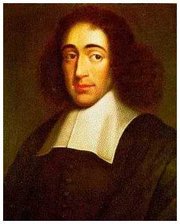Baruch Spinoza
|
|
Benedictus de Spinoza (November 24, 1632 – February 21, 1677), named Baruch Spinoza by his synagogue elders and known as Bento de Spinoza or Bento d'Espiñoza in the community in which he grew up. Along with René Descartes and Gottfried Leibniz, he was one of the great rationalists of 17th-century philosophy. He is considered the founder of modern Biblical criticism. His magnum opus was the Ethics.
| Contents |
Life
Born in Amsterdam to Sephardic Jews, he gained fame for his positions of pantheism and neutral monism, as well as the fact that his Ethics was written in the form of postulates and definitions, as though it were a geometry treatise. In the summer of 1656, he was excommunicated from the Jewish community for his claims that God is the mechanism of nature and the universe, and the Bible is a metaphorical and allegorical work used to teach the nature of God, both of which were based on a form of Cartesianism (see René Descartes). Following his excommunication, he adopted the first name Benedictus (the Latin equivalent of his given name, Baruch). The terms of his excommunication were quite severe; excerpts from the text may be found at [1] (http://www.mnstate.edu/mouch/spinoza/excomm.html).
Since the public reactions to the anonymously published Theologico-Political Treatise turned unfavourable to his brand of [2] (http://www.utm.edu/research/iep/d/descarte.htm) Cartesianism, he abstained from publishing more of his works. The Ethics was published after his death, in the Opera postuma edited by his friends.
Some of the major figures whom Spinoza met include Henry Oldenburg and Leibniz.
Known as both the "Greatest Jew" and the "Greatest Atheist", Spinoza contended that "God" and "Nature" were two names for the same reality, namely the single substance (meaning "to stand beneath" rather than "matter") that underlies the universe and of which all lesser "entities" are actually modes or modifications. He contended that "Deus sive Natura" ("God or Nature") was a being of infinitely many attributes, of which extension and thought were two. His account of the nature of reality, then, seems to treat the physical and mental worlds as two different, parallel "subworlds" that neither overlap nor interact. This formulation is a historically significant panpsychist solution to the mind-body problem known as neutral monism.
Spinoza was a thoroughgoing determinist who held that absolutely everything that happens occurs through the operation of necessity. For him, even human behaviour is fully determined, freedom being our capacity to know we are determined and to understand why we act as we do. So freedom is not the possibility to say "no" to what happens to us but the possibility to say "yes" and fully understand why things should necessarily happen that way.
Spinoza's philosophy has much in common with Stoicism, but he differed sharply from the Stoics in one important respect: he utterly rejected their contention that reason could defeat emotion. On the contrary, he contended, an emotion can be displaced or overcome only by a stronger emotion. For him, the crucial distinction was between active and passive emotions, the former being those that are rationally understood and the latter those that are not. He also held that knowledge of true causes of passive emotion can transform it to an active emotion, thus anticipating one of the key ideas of Sigmund Freud's psychoanalysis.
Modern relevance
In the late twentieth century, there was a great increase in philosophical interest in Spinoza in Europe, particularly from a left-wing or Marxist perspective. Notable philosophers Gilles Deleuze, Antonio Negri and Étienne Balibar have each written books on Spinoza. In the English speaking world, a major philosopher to write a book on Spinoza was Stuart Hampshire, though H H Joachim's work is equally valuable.
Arne Næss, the father of the deep ecology movement, acknowledged drawing much inspiration from the works of Spinoza.
Spinoza's portrait featured prominently on the older series of the 1000 Guilder banknote, which was legal tender in the Netherlands until the euro was introduced in 2002.
Bibliography
By Spinoza
- Short Treatise on God, Man and His Well-Being
- On the Improvement of the Understanding (1662) (Project Gutenberg Entry: [3] (http://gutenberg.net/etext/1016))
- Principles of Cartesian Philosophy (1663)
- Tractatus Theologico-Politicus (A Theologico-Political Treatise) (1670) (Project Gutenberg Entry: Part 1 (http://gutenberg.net/etext/989), Part 2 (http://gutenberg.net/etext/990), Part 3 (http://gutenberg.net/etext/991), Part 4 (http://gutenberg.net/etext/992))
- Ethica Ordine Geometrico Demonstrata (The Ethics) (1677) (Project Gutenberg Entry: [4] (http://gutenberg.net/etext/3800))
- Hebrew Grammar (1677)
About Spinoza
- Steven Nadler, Spinoza: A Life, Cambridge U. Press, 1999, ISBN 0-521-55210-9
See also
External links
- The Ethics (http://rwmeijer.ws/spinoza/) - Split-screen Latin/English or Latin/French
- The Ethics (http://www.earlymoderntexts.com/)A READABLE version with all the content still there.
- Vereniging Het Spinozahuis (http://cf.uba.uva.nl/en/digilib/philosophy/spinheng.html)
- The Spinoza Net (http://www.spinoza.net)
- Spinoza and Spinozism (http://bdsweb.tripod.com) - BDSweb
- A Theologico-Political Treatise (http://www.philosophyarchive.com/text.php?era=1600-1699&author=Spinoza&text=A%20Theologico-Political%20Treatise) -English Translation
- HyperSpinoza (http://hyperspinoza.caute.lautre.net)
- Internet Encyclopedia of Philosophy - Spinoza (http://www.iep.utm.edu/s/spinoza.htm)
- Wikisource:Auteur:Baruch Spinozaar:سبينوزا
bg:Барух Спиноза bn:বারুক স্পিনোজা da:Baruch de Spinoza de:Baruch Spinoza es:Baruch Spinoza eo:Spinozo fr:Baruch Spinoza ko:스피노자 hr:Baruch de Spinoza it:Baruch Spinoza he:ברוך שפינוזה nl:Baruch de Spinoza ja:バールーフ・デ・スピノザ nn:Baruch Spinoza pl:Baruch Spinoza pt:Baruch de Espinoza ro:Baruch Spinoza ru:Спиноза, Бенедикт sk:Baruch Spinoza fi:Baruch Spinoza sv:Baruch Spinoza zh:巴鲁赫·斯宾诺莎 th:บารุค สปิโนซา

